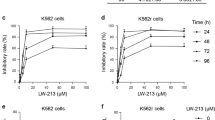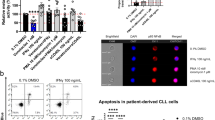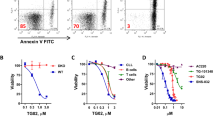Abstract
We have previously reported that prodigiosin (2-methyl-3-pentyl-6-methoxyprodigiosene) induces apoptosis in human hematopoietic cancer cell lines with no marked toxicity in nonmalignant cell lines. In this study, we demonstrate that prodigiosin induces apoptosis of B-cell chronic lymphocytic leukemia (B-CLL) cells (n=32 patients). The dose–response for the cytotoxic effect of prodigiosin was analyzed in cells from 12 patients showing an IC50 of 116±25 nM. Prodigiosin induced apoptosis of B-CLL cells through caspase activation. We also analyzed the cytotoxic effect of prodigiosin in T cells from B-CLL samples and no differences were observed with respect to leukemia cells. This is the first report showing that prodigiosin induces apoptosis in human primary cancer cells.
This is a preview of subscription content, access via your institution
Access options
Subscribe to this journal
Receive 12 print issues and online access
$259.00 per year
only $21.58 per issue
Buy this article
- Purchase on Springer Link
- Instant access to full article PDF
Prices may be subject to local taxes which are calculated during checkout





Similar content being viewed by others
References
Gerber NN . Prodigiosin-like pigments. CRC Crit Rev Microbiol 1975; 3: 469–485.
Montaner B, Navarro S, Piqué M, Vilaseca M, Martinell M, Giralt E et al. Prodigiosin from supernatant of Serratia marcescens induces apoptosis in haematopoietic cancer cell lines. Br J Pharmacol 2000; 131: 583–593.
Díaz-Ruiz C, Montaner B, Pérez-Tomás R . Prodigiosin induces cell death and morphological changes indicative of apoptosis in gastric cancer cell line HGT-1. Histol Histopathol 2001; 16: 415–421.
Montaner B, Pérez-Tomás R . Prodigiosin-induced apoptosis in human colon cancer cells. Life Sci 2001; 68: 2025–2036.
Kipps TJ . Chronic lymphocytic leukaemia. Curr Opin Hematol 1998; 5: 244–253.
Caligaris-Cappio F, Hamblin TJ . B-cell chronic lymphocytic leukaemia: a bird of a different feather. J Clin Oncol 1999; 17: 399–408.
Reed JC . Molecular biology of chronic lymphocytic leukemia. Semin Oncol 1998; 25: 11–18.
Bentley DP, Pepper CJ . The apoptotic pathway: a target for therapy in chronic lymphocytic leukemia. Hematol Oncol 2000; 18: 87–98.
Bellosillo B, Colomer D, Pons G, Gil J . Mitoxantrone, a topoisomerase II inhibitor, induces apoptosis of B-chronic lymphocytic leukaemia cells. Br J Haematol 1998; 100: 142–146.
Consoli U, El-Tounsi I, Sandoval A, Snell V, Kleine HD, Brown W et al. Differential induction of apoptosis by fludarabine mono-phosphate in leukemic B and normal T cells in chronic lymphocytic leukemia. Blood 1998; 91: 1742–1748.
Bellosillo B, Villamor N, Colomer D, Pons G, Montserrat E, Gil J . In vitro evaluation of fludarabine in combination with cyclophosphamide and/or mitoxantrone in B-cell chronic lymphocytic leukemia. Blood 1999; 94: 2836–2843.
Bellosillo B, Piqué M, Barragán M, Castaño E, Villamor N, Colomer D et al. Aspirin induces apoptosis and activation of caspases in B-cell chronic lymphocytic leukaemia cells. Blood 1998; 92: 1406–1414.
Pepper C, Thomas A, Hoy T, Bentley P . Chlorambucil resistance in B-cell chronic lymphocytic leukaemia is mediated through failed Bax induction and selection of high Bcl-2-expressing subclones. Br J Haematol 1999; 104: 581–588.
Piqué M, Barragán M, Dalmau M, Bellosillo B, Pons G, Gil J . Aspirin induces apoptosis through mitochondrial cytochrome c release. FEBS Lett 2000; 480: 193–196.
Bellosillo B, Dalmau M, Colomer D, Gil J . Involvement of CED-3/ICE proteases in the apoptosis of B-chronic lymphocytic leukaemia cells. Blood 1997; 89: 3378–3384.
Vogelstein B, Lane D, Levine AJ . Surfing the p53 network. Nature 2000; 408: 307–310.
Kawauchi K, Shibutani K, Yagisawa H, Kamata H, Nakatsuji S, Anzai H et al. A possible immunosuppressant, cycloprodigiosin hydrochloride, obtained from Pseudoalteromonas denitrificans. Biochem Biophys Res Commun 1997; 237: 543–547.
Yamamoto D, Uemura Y, Tanaka K, Nakai K, Yamamoto C, Takemoto H et al. Cycloprodigiosin hydrochloride, H+/Cl− symporter, induces apoptosis and differentiation in HL-60 cells. Int J Cancer 2000; 88: 121–128.
Yamamoto C, Takemoto H, Kuno K, Yamamoto D, Tsubura A, Kamata K et al. Cycloprodigiosin hydrochloride, a new H+/Cl− symporter, induces apoptosis in human and rat hepatocellular cancer cell lines in vitro and inhibits the growth of hepatocellular carcinoma xenografts in nude mice. Hepatology 1999; 30: 894–902.
Yamamoto D, Kiyozuca Y, Uemura Y, Yamamoto C, Takemoto H, Hirata H et al. Cycloprodigiosin hydrochloride, a H+/Cl− symporter, induces apoptosis in human breast cancer cell lines. J Cancer Res Clin Oncol 2000; 126: 191–197.
Kamata K, Okamoto S, Oka S, Kamata H, Yagisawa H, Hirata H . Cycloprodigiosin hydrochloride suppresses tumor necrosis factor (TNF) α-induced transcriptional activation by NF-κB. FEBS Lett 2000; 507: 74–80.
Han SB, Kim HM, Kim YH, Lee CW, Jang E, Son KH et al. T-cell specific immunosuppression by prodigiosin isolated from Serratia marcescens. Int J Immunopharmacol 1998; 20: 1–13.
Han SB, Park SH, Jeon YJ, Kim YK, Kim HM, Yang KH . Prodigiosin blocks T cell activation by inhibiting interleukin-2Rα expression and delays progression of autoimmune diabetes and collagen-induced arthritis. J Pharmacol Exp Ther 2001; 299: 415–425.
Azuma T, Watanabe N, Yagisawa H, Hirata H, Iwamura M, Kobayashi Y . Induction of apoptosis of activated murine splenic T cells by cycloprodigiosin hydrochloride, a novel immunosuppressant. Immunopharmacology 2000; 46: 29–37.
Songia S, Mortellaro A, Taverna S, Fornasiero C, Scheiber EA, Erba E et al. Characterization of the new immunosuppressive drug undecylprodigiosin in human lymphocytes. J Immunol 1997; 158: 3987–3995.
Mortellaro A, Songia S, Gnocchi P, Ferrari M, Fornasiero C, D'Alessio R et al. New immunosuppressive drug PNU156804 blocks IL-2 dependent proliferation and NF-κB and AP-1 activation. J Immunol 1999; 162: 7102–7109.
Stepkowski SM, Erwin-Cohen RA, Behbod F, Wang M, Qu X, Tejpal N et al. Selective inhibitor of Janus tyrosine kinase 3, PNU156804, prolongs allograft survival and acts synergistically with cyclosporine but additively with rapamycin. Blood 2002; 99: 680–689.
Melvin MS, Tomlinson JT, Saluta GR, Kucera GL, Lindquist N, Manderville RA . Double-strand DNA cleavage by copper-prodigiosin. J Am Chem Soc 2000; 122: 6333–6334.
Acknowledgements
We thank Dr Ernest Giralt, Dr Marta Vilaseca, and Marc Martinell (Organic Chemistry Department and Mass Spectrometry Unit, University of Barcelona) for the purification of prodigiosin. We also thank Dr Esther Castaño, Dr José Manuel López-Blanco, Daniel Iglesias, Antonio Fernández and Llorenç Coll for helpful discussions and suggestions, and R Rycroft for language assistance. C Campàs and M Barragán are recipients of a research fellowship from the Fundación Ramón Areces and the Ministerio de Ciencia y Tecnología, respectively.
Author information
Authors and Affiliations
Additional information
This study was supported by Grants from the Ministerio de Ciencia y Tecnología and FEDER (SAF 2001-3026) to J Gil, and by a Grant from ‘La Marató de TV3’ (ref#001510) to R Pérez-Tomás.
Rights and permissions
About this article
Cite this article
Campàs, C., Dalmau, M., Montaner, B. et al. Prodigiosin induces apoptosis of B and T cells from B-cell chronic lymphocytic leukemia. Leukemia 17, 746–750 (2003). https://doi.org/10.1038/sj.leu.2402860
Received:
Accepted:
Published:
Issue Date:
DOI: https://doi.org/10.1038/sj.leu.2402860
Keywords
This article is cited by
-
Prodigiosin: a fascinating and the most versatile bioactive pigment with diverse applications
Systems Microbiology and Biomanufacturing (2024)
-
Transcriptomic analysis of the antimicrobial activity of prodigiosin against Cutibacterium acnes
Scientific Reports (2023)
-
Rise of the natural red pigment ‘prodigiosin’ as an immunomodulator in cancer
Cancer Cell International (2022)
-
Fabrication and characterization of pigmented secondary metabolites bound liposomes with improved cytotoxic activity against prostate and hepatic cancer
International Nano Letters (2022)
-
Biotechnological Activities and Applications of Bacterial Pigments Violacein and Prodigiosin
Journal of Biological Engineering (2021)



